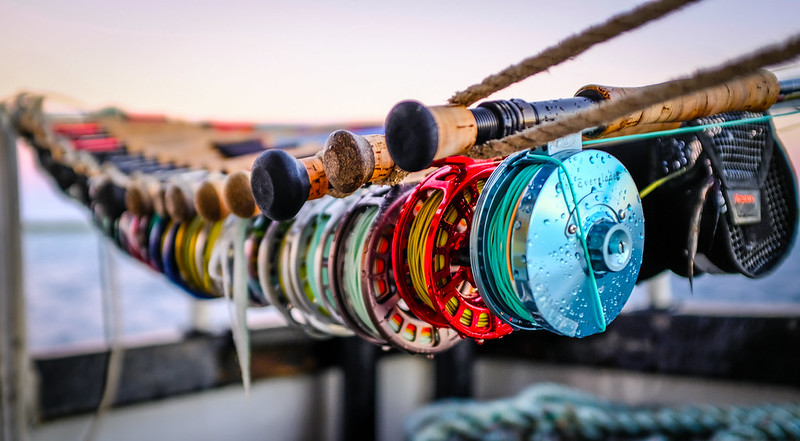
Your First Fly Rod. A Buyer’s Guide
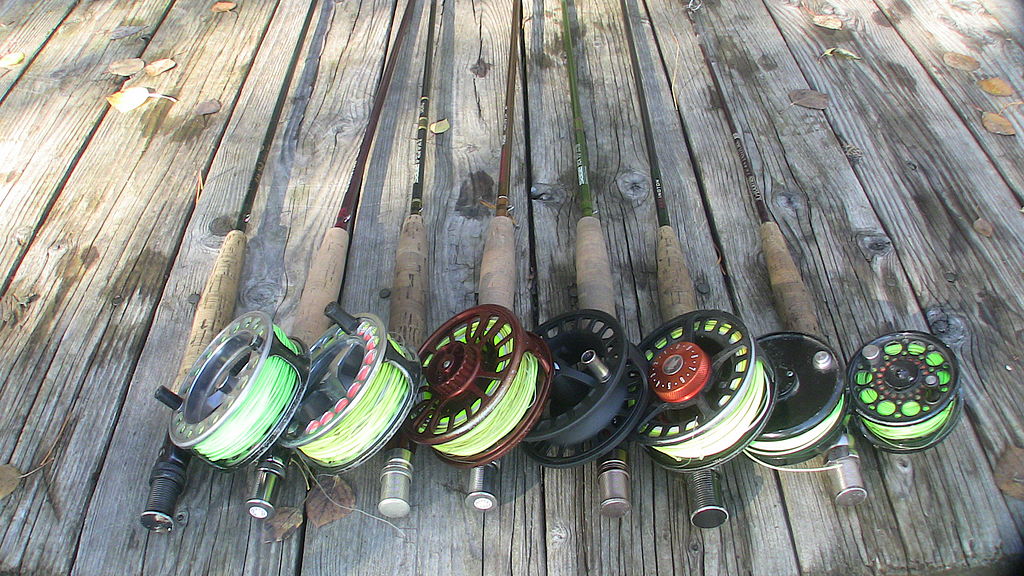
So you have dabbled in the fly fishing world enough to decide it is time to take the next step and get that first fly rod of your very own. This is a buyer’s guide, but not the typical comparison of top models. This is a guide to finding it yourself. Most likely just like your first vehicle, your “first” fly rod should belong to someone else.
That first vehicle was suitable for your environment and you learned to drive close to home. An air-conditioned van for the family of five in the Florida suburbs. Maybe an old, but serviceable, 4×4 pickup for the farm folks in Idaho. A snowmobile in the Arctic circle for village members that are teaching new drivers how to best get around.
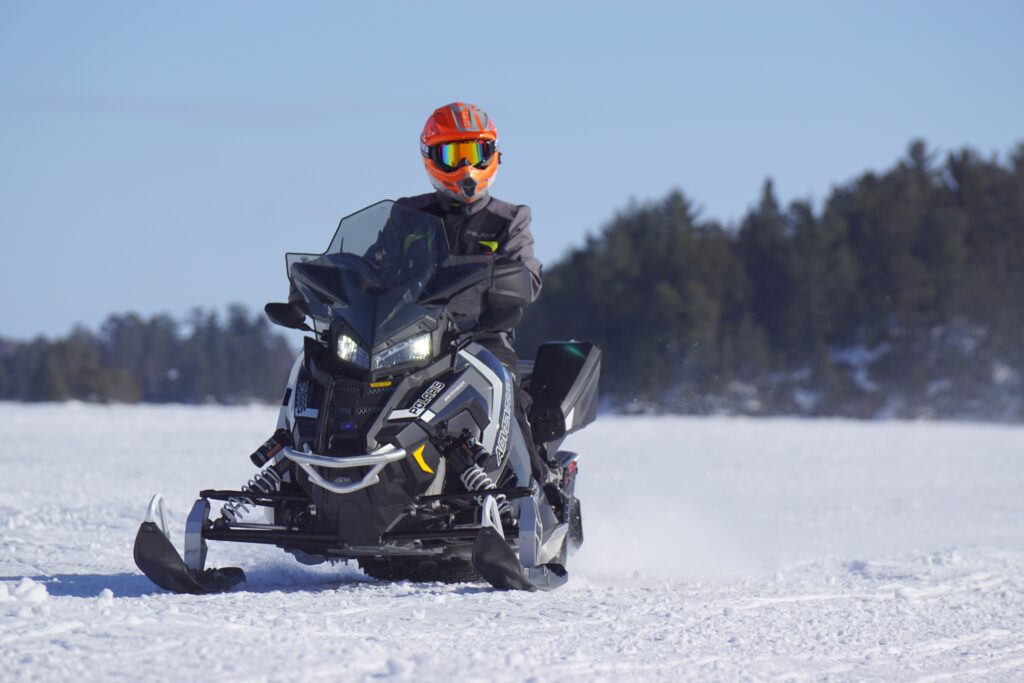
On the other hand, A snowmobile in Florida would be very impractical. No real chance you have a dealer in town. Even if you do buy one, you would have to take it to another geography to use it. No one in your circle has one or has a clue on how to maintain it. You are on your own.
To clearly connect the dots here, you are first figuring out how the vehicle works, then figuring out how to work it and putting it all together to determine your first purchase that you proudly own yourself. All in the company of others with previous experience in a suitable environment.
Just like vehicles, fly rods come in very different forms and work much better (and are more pleasurable to use) in some environments than others. A 14-foot, two-handed spey rod may be the perfect tool if you are trying to best the Chinook Salmon IFGA record on the Kenai River in Alaska but would be a horrible choice for a brush-choked, high elevation freestone mountain stream with tiny brook trout.
So What do you do to find your first fly rod?
Assuming you have little to no real casting experience, find someone who has a few fly rods that is willing to put up with your ass as you learn “how to drive”. Here are some roads to travel:
Go fly fishing with a friend, family member, work associate or someone else who has some tackle and experience.
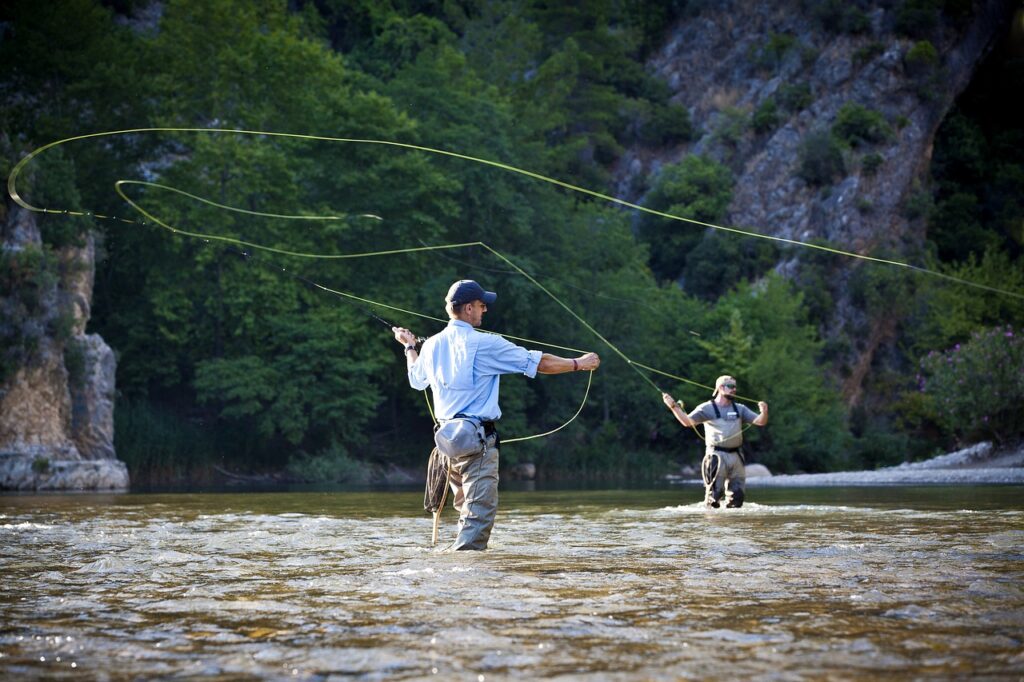
Honesty is the only policy to follow when making this request. Fessing up that you have no experience, but lots of desire, means they must be willing to start with you from the beginning. They are in for a day of answering questions, telling you things you don’t know to ask and watching you make all the mistakes they have already made. Some of the nicest people you know simply won’t be cut out for the job. This may be an exception to the truncation of the line from George Bernard Shaw, “those that can’t do, teach”. “Those that can do, may want to strangle you by the end of the day”. Ask wisely.
Pay a visit to your local fly shop.
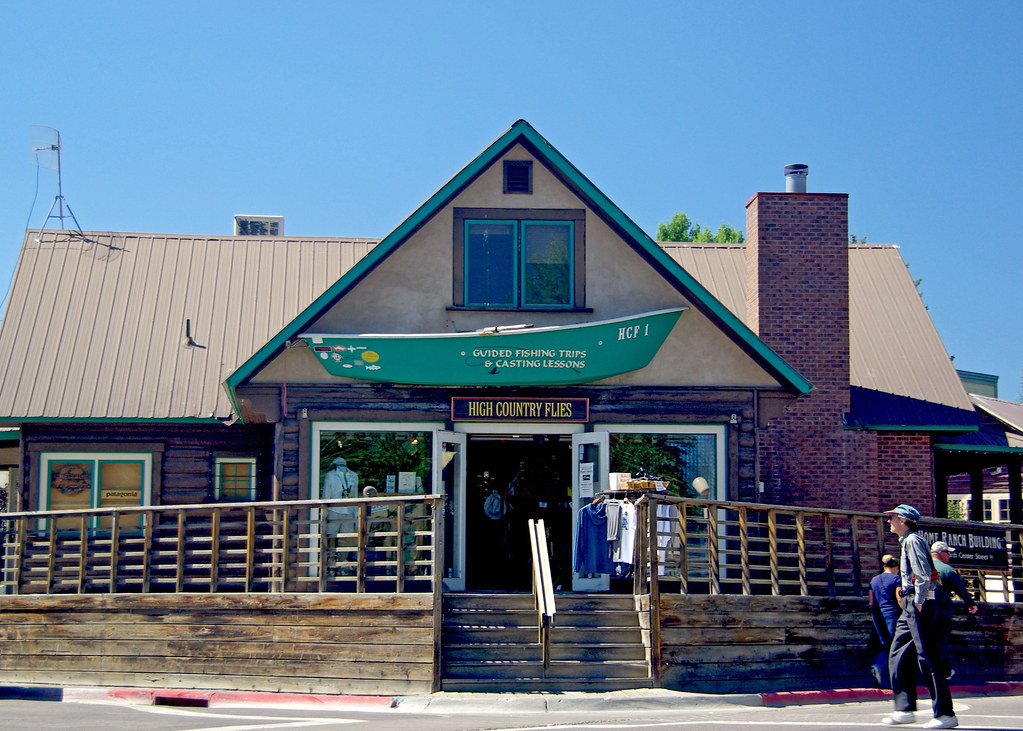
To stretch the vehicle analogy a bit, finding your fly shop is like finding your go-to mechanic. Fly shop folks are usually very knowledgeable, passionate about the sport and willing to take the time to help anyone at any level. There is the occasional grumpy guy who would rather be on the water than stuck in the shop, but who can blame him, right? I am on a first-name basis with my fly shop owner and support his local, small business when I can. Amazon will not give you a local fishing report and genuine customer service. Most fly shops are also a hub for local guides. The guides may be shop employees or simply on the owner’s “list” and work for themselves.
Go fly fishing with a professional “friend”.

Hire one of those guys from the fly shop to take you on the water. I have never regretted spending the money to hire a guide. I have regretted the time wasted trying to figure it out instead of fishing. A side benefit of going with a guide is learning some local waters. So, in addition to leveling up your skills, you also get some insight on where to fish in general, and specifically, on the stream. Some ethics to consider here. Use this opportunity for a place to start if you have no idea where to fish. Your inept impact won’t make much of a difference, but don’t try to be the cool kid with the awesome new fishing spot you just have to tell everyone about. The same “honesty is the only policy” applies. Even professional guides may not be cut out for the rank beginner. They may not have the assortment of rods. They may not have the patience. If they are not, and are true pros, they should be able to connect you with someone else that is more suited for the task. If you hit a dead-end, ask if they can recommend somewhere you can take casting lessons.
Take fly casting lessons.
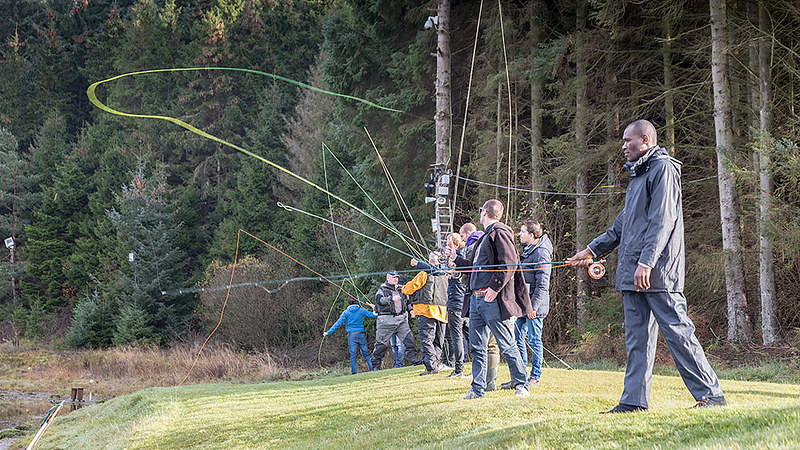
This may seem like the obvious first choice. To be clear, you will benefit from casting lessons. The best fly rod in the world cannot make up for poor casting. I recommend formal casting lessons for all beginners. However, in the context of helping you find your first fly rod, I rank it down the list for a few reasons:
- Focus is on casting. You learn casting, often off the water. True use of fly rod includes hook-setting, mending, (hopefully) fish playing and other nuances that casting lessons may not get to. However, you do start off with some good basics that may prevent problems as you progress.
- You are not the only one (usually) in the class. If you are in a group, you don’t get the individual focus the other methods may provide.
- One and done relationship. Unless you book on-going, private lessons with the instructor, this option does little to build a relationship. If you go with a friend, you now have that in common. Even if you go with a guide, you, at least, have someone who knows you if you want to continue to advance and book additional trips.
- Sponsored tackle. Most casting courses are “brought to you by [insert rod company name]”. This doesn’t discount the quality of rod or instruction, just limits exposure to a line of rods from that manufacturer.
- Canned instruction. With some exceptions I am sure, these courses tend to follow a script for teaching you to cast. The real world casting situations you will encounter with an experienced mentor will provide you with invaluable insight into lots of casting and fishing situations on your home water.
- You have to give it back. You have a really good chance of being able to buy a rod and almost zero chance of being able to continue to use it on your own. You are not ready to commit to a purchase at this point. Your buddy or even local fly shop may let you get in a few more trips using their gear to help narrow things down.
More to Think About
So, you got a chance to get your hands on some rods and put them to use. You have an idea of general category of rod or maybe you have found “the one”. Question. Do you still own your first vehicle? If you are of a certain age, probably not. However, there are some that will answer, “yes”. Same for fly rods. I happen to still own my first rod and fish it often. Others trade rods like commodities and there is no harm there either. Here are some additional things to consider:
Your First Fly Rod – New or Used?
Many rods come with a lifetime warranty. Sounds great, right? Well, getting into the fine print will reveal this may not be what you think. The lifetime warranty typically specifies some version of “against manufacturer defects”. These are usually discovered quickly and most require shipping the rod back to them for inspection and decision on what to do. The more typical breakage warranty involves the purchase of “insurance” in the form of $ per section and typically requires you to send the broken section in for exchange. Some warranties also require an original receipt and may only apply to the original owner. Here are examples from Sage, G.Loomis and Redington (no endorsement of any company is implied, this is simply warranty information for some known names in the industry).
I would not recommend buying a used rod from an unknown source (like eBay or Craigslist). A decent rod is an investment and you have no idea what the rod’s life has been like. Even if it appears okay in the pics, improper storage or mindless assembly and breakdown may have developed microscopic fractures in the ferrules that may show up later as a broken rod and you may be out of luck on getting it covered.
However, if you have a rod in hand from a reliable source (like your new fishing buddy) and they are willing to part with it. Make them a fair offer with the knowledge that most fly rods hold value pretty well so a “great deal” may be more than what you want to pay but still fair.
Rod Construction
The strongest, most reliable rod would be one piece. This would also be the most impractical. Fly rods typically range from 2-7 sections (pieces). The fewer the sections, the longer the rod storage tube. 7-piece rods are typically designated as “travel rods” and preferred by backpackers. 2-piece rods are more reliable but more difficult to travel with. A 4-piece rod seems to hit the sweet spot and allows for carry-on airline travel (check rules and regulations before trying to carry on your fly rod). Note, if you are confused by seeing pictures of 4-piece rods displaying 5 pieces in the photo, some manufacturers ship rods with two tip sections. This is the one most often broken sections and it is really nice to have a spare in your rod tube. Consider this in your decision-making.
Combos or Kits
We have talked only about rods to this point but you will need a reel, backing and fly line as well. As tempting as it may be, avoid buying a combo or kit with all the above bundled together for a single price. Rod manufacturers often do not make reels and fly lines. They rely on third parties and buy in bulk from various manufacturers to keep their, and your cost down. The quality of the reel, backing and fly line may not match that of the rod. Rely on your contacts to recommend a reel, backing and line. Most fly shops will be happy to help you find the right equipment and get it all put together correctly.
Avoid Big Box Retailers for Your First Fly Rod (and then all to follow)
Minimum Advertised Pricing (MAP) policies dictate much of retail today and fly rods are no exception. This simply means you are likely to pay the same price regardless of where you purchase the product (including the manufacturer’s website). There are exceptions and deals and discounts in other forms may come into play. Search for yourself. (Not an endorsement or recommendation, simply for comparison) At the time of this writing, Sage Foundation fly rod is $425 at Bass Pro, Cabela’s, Amazon and every small fly shop online. However, buying from a local fly shop helps ensure you are handed a rod free of defects, they can get it set up properly for you (if you ask nicely or pay a small fee) and they often have a direct relationship with the supplier so they can “get things done” if there is a problem. In addition to supporting a local business, you have the opportunity to start a relationship with someone with more area knowledge of waters, patterns, guides and equipment than Jeff Bezos.
Join the conversation below and leave a comment. You may also contact me.
24 thoughts on “Your First Fly Rod. A Buyer’s Guide”
Good V I should certainly pronounce, impressed with your site. I had no trouble navigating through all tabs as well as related information ended up being truly easy to do to access. I recently found what I hoped for before you know it at all. Quite unusual. Is likely to appreciate it for those who add forums or anything, site theme . a tones way for your client to communicate. Nice task..
Ocean Cleaning Services offers professional cleaning services in Vancouver, providing reliable residential and commercial solutions with eco-friendly products and top-quality results.
Discover the essence of elegance with Nilafar Perfumes, where every fragrance is crafted to celebrate the beauty and strength of women.best perfume for woman.
What a refreshing take on choosing your first fly rod—it’s like buying your first car, but for fishing! I love the idea of finding a mentor or someone experienced to guide you, as it adds a personal touch to the learning process. The comparison to vehicles is spot-on; you wouldn’t use a snowmobile in Florida, so why pick a fly rod that doesn’t suit your environment? It’s also interesting to think about how the right rod can make the experience more enjoyable, especially if you’re just starting out. Do you think beginners often overlook the importance of matching the rod to their specific fishing conditions? I’d also argue that the social aspect—learning from others—is just as crucial as the gear itself. What’s your go-to piece of advice for someone trying to find their first fly rod? Let’s hear it!
Interesting perspective on choosing your first fly rod! I never thought of comparing it to buying a first vehicle, but it makes a lot of sense. The idea of starting with someone else’s rod and learning from their experience seems practical and less overwhelming. It’s true that the environment plays a huge role in what works best, just like with vehicles. I also liked how you emphasized honesty when asking for help—being upfront about being a beginner can really speed up the learning process. But what if you don’t know anyone who fly fishes? How would you suggest finding a mentor or someone willing to lend a rod? Also, do you think it’s better to invest in a versatile rod first or focus on something specific for your local fishing spot? Curious to hear your thoughts!
Interestingly, the analogy between choosing a first fly rod and a first vehicle is quite clever and relatable. It makes sense that your first fly rod, like a first car, should suit your environment and skill level. I agree that relying on someone experienced to guide you is invaluable, especially when starting out. However, isn’t there a risk of inheriting someone else’s preferences rather than discovering what works best for you personally? I wonder if there’s a way to strike a balance between learning from others and exploring your own style. What’s your take on this? Would you recommend starting with a borrowed rod, or is it better to dive straight into buying your own? I’d love to hear your thoughts!
So you’re saying the first fly rod should be someone else’s, like a hand-me-down car? That makes sense, but isn’t it also about the personal connection to your own gear? I get the analogy with vehicles, but fishing feels more personal—like, wouldn’t you want your first rod to reflect *your* style and preferences, even if you’re still learning? The whole idea of borrowing first seems practical, but it also feels like you might miss out on the excitement of owning something uniquely yours from the start. What if you end up loving a rod that’s completely different from what you’ve borrowed? Also, how do you even know what environment you’ll be fishing in most often if you’re just starting out? I’m curious, though—what’s your take on this? Do you think borrowing first is the *only* way to go, or is there room for beginners to dive in and buy their own right away?
Interesting perspective on choosing your first fly rod! I never thought about comparing it to picking your first vehicle, but it makes a lot of sense. It’s true that the environment and your needs should dictate the choice, not just the latest or most popular model. I wonder, though, how do you know when you’re ready to move from borrowing to buying your own rod? Also, what if you don’t have someone experienced around to guide you—how do you navigate that? The idea of starting with a used rod seems practical, but how do you ensure it’s still in good condition? Lastly, do you think it’s better to start with a versatile rod or one tailored to a specific type of fishing? Would love to hear your thoughts!
This guide is a refreshing take on choosing your first fly rod, emphasizing the importance of learning in the right environment. The analogy with vehicles makes it easier to understand the concept of suitability and practicality. I appreciate the focus on seeking guidance from experienced individuals rather than jumping into a purchase blindly. The emphasis on honesty and humility when asking for help is a great point—it’s how real connections and learning happen. However, I wonder, what if you don’t have access to someone with multiple rods or experience? Are there alternative ways to approach this? And do you think it’s worth investing in a cheaper rod first, or should you aim for quality right away? What’s your take on learning purely through trial and error, or is mentorship always the better route?
I would like to express my gratitude for your kindness for those who actually need help with this important area of interest. Your special dedication to passing the solution up and down has been certainly useful and has without exception made those like me to realize their pursuits. Your amazing useful useful information means this much a person like me and still more to my fellow workers. Regards; from each one of us.
Starting with fly fishing is such an exciting journey! I love how the text compares choosing a fly rod to picking your first vehicle—it’s so relatable. It makes sense to start with something practical and learn from others who’ve been there. I’m curious, though, how do you even begin to figure out what kind of fly rod suits your environment? The idea of using a 14-foot spey rod in a tiny mountain stream sounds like a disaster waiting to happen. Do you think it’s better to borrow a rod first or just dive in and buy one? Also, how do you find someone experienced who’s willing to teach you without feeling like a burden? I’d love to hear your thoughts!
Great advice for anyone stepping into the world of fly fishing! I love how you compared choosing a fly rod to picking a first vehicle—it’s such a relatable analogy. It makes total sense to start with something practical and suited to your environment rather than jumping into the deep end with something overly specialized. I’m curious, though, how do you suggest finding someone experienced who’s willing to mentor a beginner? It feels like a big ask, especially if you don’t already know someone in the fly fishing community. Also, do you think it’s worth investing in a used rod first, or should beginners go straight for something new? I’d love to hear your thoughts on how to balance cost and quality when starting out. What’s the most common mistake you’ve seen beginners make when choosing their first rod?
Some truly good information, Gladiolus I noticed this.
This is such a refreshing take on choosing your first fly rod! I never thought about comparing it to picking your first vehicle, but it makes so much sense. It’s true that the environment and your needs should dictate your choice, not just what’s popular or flashy. I’m curious, though, how do you even begin to figure out what kind of fly rod suits your local fishing spots? It feels like there’s so much to consider—length, weight, and even the type of fish you’re after. Do you think it’s better to start with a more versatile rod or one that’s super specific? Also, how do you find someone experienced enough to guide you through this process without feeling like a burden? I’d love to hear your thoughts because this seems like a journey that’s as much about learning as it is about fishing. What’s the most important lesson you’ve learned from your first fly rod experience?
emye12
“That’s a really interesting take on choosing your first fly rod! I never thought about comparing it to picking your first vehicle, but it makes so much sense. It’s true that the environment and your needs should guide your decision, just like with cars. I’m curious, though—how do you even start finding someone experienced to guide you through this process? It feels a bit intimidating to ask for help, especially if you’re a beginner. Do you think most fly fishers are open to mentoring newcomers? Also, what’s your opinion on starting with a used rod versus a new one? I’d love to hear your thoughts on this—it’s such a fascinating topic, and I’m sure others would too!”
This is such a refreshing take on choosing your first fly rod! I love how you compare it to picking your first vehicle—it makes so much sense. It’s true that the environment and your needs should dictate your choice, not just the latest trends. I’ve always wondered, though, how do you even start finding someone experienced to guide you through this process? It feels a bit intimidating to ask for help, especially if you’re a beginner. Do you think it’s better to borrow a rod first or just dive in and buy one? Also, what’s your opinion on starting with a more versatile rod versus something super specialized? I’d love to hear your thoughts because this whole process seems both exciting and a bit overwhelming!
This is a great guide for anyone looking to dive into fly fishing! I love how it emphasizes the importance of starting with the right tool for your environment, just like choosing a vehicle. It’s so true that a snowmobile in Florida would be pointless—why not apply that logic to fly rods? I’m curious, though, how do you even begin to find someone experienced enough to guide you through this process? It feels like a big ask to have someone lend you their gear and teach you. Do you think it’s better to start with a cheaper rod to practice on your own, or is it worth waiting to find a mentor? Also, what’s the best way to approach someone for help without coming off as a total newbie? I’d love to hear your thoughts on this—what worked for you when you were starting out?
Hello! I just would like to give a huge thumbs up for the great info you have here on this post. I will be coming back to your blog for more soon.
This is a really interesting take on choosing your first fly rod! I never thought about comparing it to picking your first vehicle, but it makes so much sense. It’s true that the environment and your needs should dictate your choice, just like with cars. I wonder, though, how do you even begin to figure out what kind of fly rod suits your local fishing spots? It seems like there’s so much to consider—length, weight, and even the type of fish you’re after. I’d love to hear more about how you narrowed it down when you were starting out. Also, do you think it’s better to borrow a rod first or just dive in and buy one? I’m curious because I’m in the same boat—ready to take the plunge but not sure where to start. What’s your advice for someone who’s completely new to this?
So, you’re diving into fly fishing and looking for your first rod—interesting approach to compare it to buying a first vehicle. I like the idea of starting with a borrowed rod to learn the ropes, but isn’t it also important to have something that feels like your own from the start? The analogy with vehicles is clever, but do you think it might oversimplify the process of choosing a fly rod? I’m curious, how do you balance learning from others while still making a choice that’s personal and tailored to your needs? Also, what if you don’t have someone experienced around to guide you—what’s the next best step? The emphasis on environment makes sense, but how do you know which rod suits your local waters without trial and error? And finally, do you think this approach might discourage beginners who don’t have access to a mentor or a community of experienced anglers?
This is such an insightful guide for beginners in fly fishing! I love the analogy between choosing your first fly rod and your first vehicle—it really puts things into perspective. It’s true that the environment plays a huge role in determining the right gear, and I couldn’t agree more that starting with a borrowed rod is a smart move. The mention of regional suitability, like the snowmobile in Florida, is a great example of what not to do. I’m curious, though, how do you suggest finding someone experienced enough to guide you through this process? Also, what’s your take on beginner-friendly rods—are there any brands or types you’d absolutely recommend? This post makes me want to go out and try fly fishing, but I’d love to hear your thoughts before diving in!
Choosing your first fly rod is indeed a significant step, and I appreciate the analogy with vehicles—it makes the process more relatable. It’s interesting how the author emphasizes the importance of environment and experience in making the right choice. I wonder, though, how one can identify the “right” person to guide them in this journey. Should it be someone with years of experience, or is a fellow beginner also a good option? The idea of starting with a used rod makes sense, but how do you ensure it’s still in good condition? Also, the mention of different rods for different environments is spot on, but what if you’re someone who plans to fish in various locations? Would it be better to invest in a versatile rod or stick to one tailored for a specific environment? Lastly, the honesty part is crucial, but how do you approach someone without feeling like you’re imposing? I’d love to hear more about your thoughts on this!
By the way, we’ve integrated libersave into our regional voucher system. It’s amazing how easily it allows us to bundle different providers on one platform.
Fly fishing seems like a fascinating journey, and this guide offers a unique perspective on choosing your first fly rod. I like how it compares the process to buying your first vehicle, emphasizing the importance of context and environment. It’s refreshing to see advice that focuses on learning from others rather than just comparing products. The idea of starting with a borrowed rod makes a lot of sense—why invest in something you might not fully understand yet? I’m curious, though, how do you find someone willing to mentor you in this process? It feels like a big ask, especially for beginners. Also, do you think the analogy with vehicles oversimplifies the learning curve of fly fishing? I’d love to hear your thoughts on this approach!
By the way, we’ve integrated libersave into our regional voucher system. It’s amazing how easily it allows us to combine various providers on one platform.